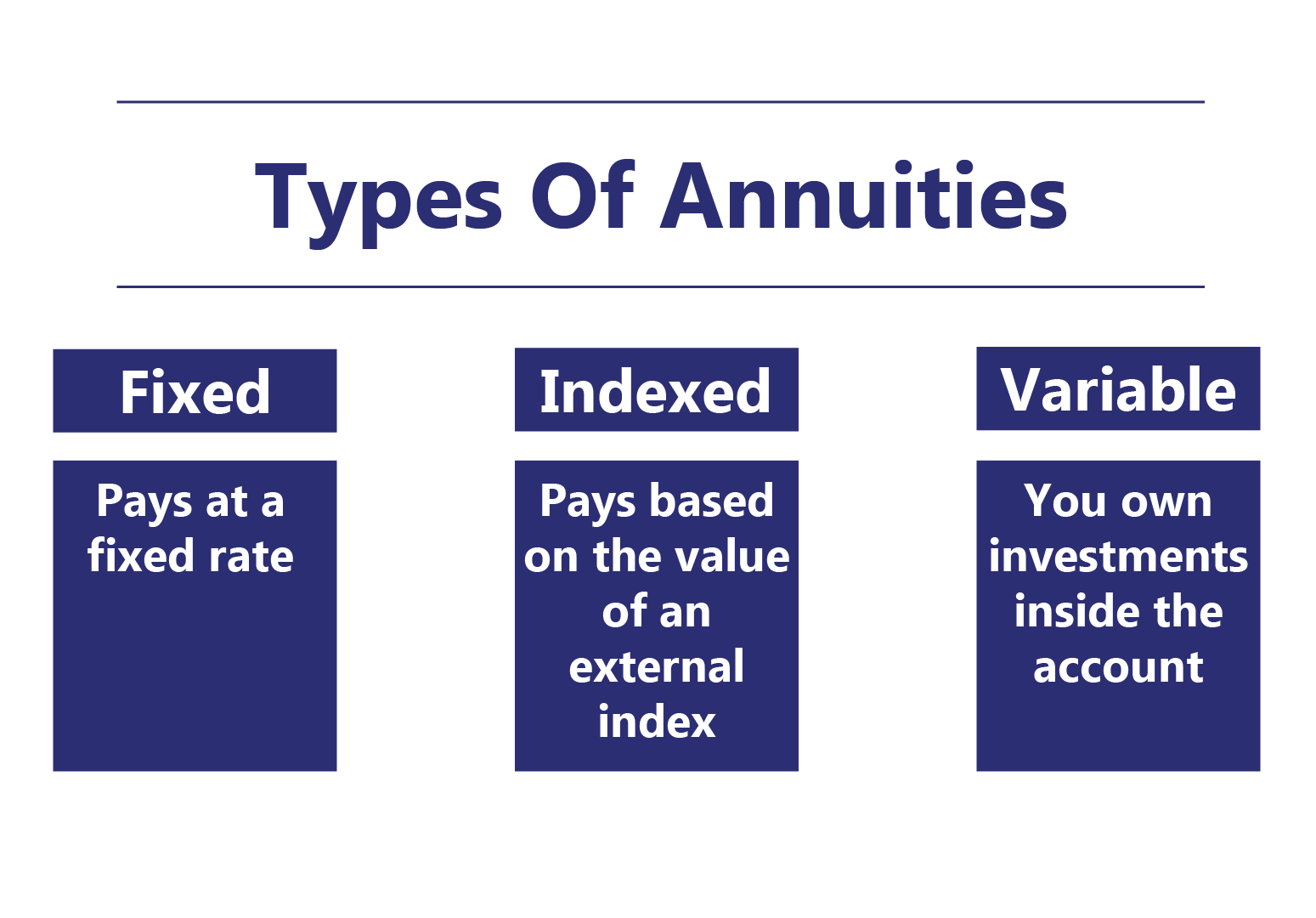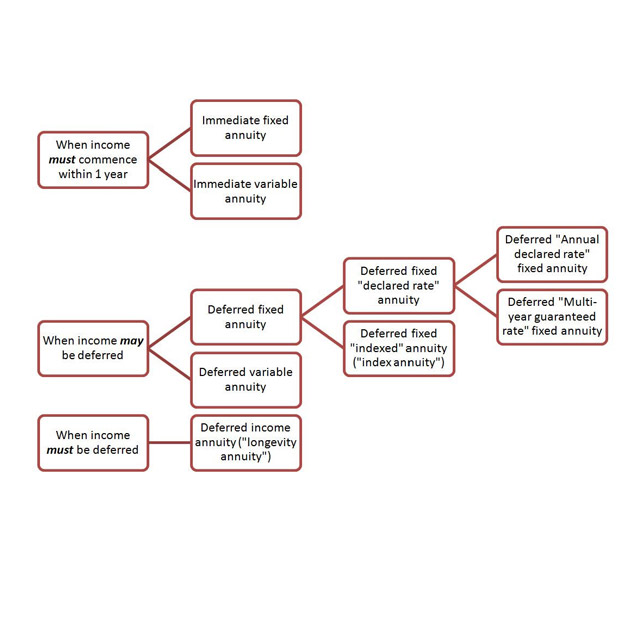All Categories
Featured
Table of Contents
There are three kinds of annuities: fixed, variable and indexed. With a dealt with annuity, the insurance provider assures both the rate of return (the rates of interest) and the payment to the investor. The rate of interest on a fixed annuity can transform over time. Frequently the rate of interest is dealt with for a number of years and afterwards modifications occasionally based on current prices.
With a deferred set annuity, the insurer consents to pay you no less than a defined price of interest during the time that your account is expanding. With an instant set annuityor when you "annuitize" your postponed annuityyou obtain an established fixed amount of money, usually on a regular monthly basis (similar to a pension plan).
And, unlike a fixed annuity, variable annuities do not give any guarantee that you'll gain a return on your investment. Instead, there's a risk that you might actually lose money.
Breaking Down Your Investment Choices Key Insights on What Is Variable Annuity Vs Fixed Annuity Breaking Down the Basics of Investment Plans Benefits of Choosing the Right Financial Plan Why Fixed Income Annuity Vs Variable Annuity Matters for Retirement Planning How to Compare Different Investment Plans: Explained in Detail Key Differences Between Different Financial Strategies Understanding the Key Features of Long-Term Investments Who Should Consider Fixed Annuity Vs Variable Annuity? Tips for Choosing the Best Investment Strategy FAQs About Fixed Interest Annuity Vs Variable Investment Annuity Common Mistakes to Avoid When Planning Your Retirement Financial Planning Simplified: Understanding Your Options A Beginner’s Guide to Smart Investment Decisions A Closer Look at How to Build a Retirement Plan
Due to the complexity of variable annuities, they're a leading resource of financier complaints to FINRA. Before buying a variable annuity, very carefully reviewed the annuity's prospectus, and ask the person offering the annuity to clarify all of the product's attributes, motorcyclists, expenses and limitations. Indexed annuities usually provide a minimal surefire rate of interest price incorporated with an interest rate linked to a market index.
Comprehending the features of an indexed annuity can be complicated. There are several indexing methods firms make use of to compute gains and, because of the selection and intricacy of the techniques used to credit history interest, it's challenging to contrast one indexed annuity to another. Indexed annuities are typically classified as one of the adhering to two types: EIAs supply a guaranteed minimum rate of interest price (normally at the very least 87.5 percent of the costs paid at 1 to 3 percent rate of interest), as well as an extra rates of interest connected to the performance of several market index.

Conservative investors who value security and security. Those nearing retired life who wish to sanctuary their properties from the volatility of the stock or bond market. With variable annuities, you can buy a range of safeties consisting of supply and bond funds. Stock market efficiency establishes the annuity's worth and the return you will get from the money you spend.
Comfy with changes in the stock exchange and want your investments to equal rising cost of living over an extended period of time. Youthful and intend to prepare monetarily for retirement by gaining the gains in the stock or bond market over the long term.
As you're developing your retirement cost savings, there are many means to stretch your money. can be specifically useful financial savings devices due to the fact that they ensure an income amount for either a set time period or for the remainder of your life. Repaired and variable annuities are two alternatives that supply tax-deferred growth on your contributionsthough they do it in various means.
Understanding Fixed Interest Annuity Vs Variable Investment Annuity A Comprehensive Guide to Investment Choices Defining Variable Annuity Vs Fixed Annuity Features of Indexed Annuity Vs Fixed Annuity Why Choosing the Right Financial Strategy Is a Smart Choice How to Compare Different Investment Plans: Simplified Key Differences Between Fixed Indexed Annuity Vs Market-variable Annuity Understanding the Key Features of What Is A Variable Annuity Vs A Fixed Annuity Who Should Consider Strategic Financial Planning? Tips for Choosing Fixed Vs Variable Annuity Pros Cons FAQs About Planning Your Financial Future Common Mistakes to Avoid When Choosing a Financial Strategy Financial Planning Simplified: Understanding Your Options A Beginner’s Guide to Immediate Fixed Annuity Vs Variable Annuity A Closer Look at How to Build a Retirement Plan
variable annuity or both as you outline out your retired life earnings plan. A provides a guaranteed interest price. It's considered a conventional product, supplying a moderate profits that are not connected to market efficiency. Your agreement value will enhance as a result of the accrual of ensured rate of interest incomes, meaning it won't decline if the market experiences losses.
An includes bought the stock exchange. Your variable annuity's investment efficiency will affect the size of your savings. It may ensure you'll obtain a collection of payments that start when you retire and can last the remainder of your life, provided you annuitize (begin taking repayments). When you start taking annuity settlements, they will depend upon the annuity value back then.
Market losses likely will lead to smaller sized payouts. Any passion or various other gains in either kind of agreement are protected from current-year taxation; your tax obligation obligation will come when withdrawals start. Let's consider the core attributes of these annuities so you can choose exactly how one or both might fit with your general retired life approach.

A set annuity's value will certainly not decline as a result of market lossesit's constant and secure. On the other hand, variable annuity worths will certainly vary with the efficiency of the subaccounts you elect as the markets rise and fall. Revenues on your fixed annuity will very depend upon its acquired rate when purchased.
Conversely, payment on a dealt with annuity acquired when rate of interest are low are most likely to pay out incomes at a lower price. If the rate of interest is ensured for the size of the agreement, profits will certainly remain consistent despite the markets or rate task. A set price does not mean that dealt with annuities are safe.
While you can't arrive at a set rate with a variable annuity, you can select to spend in traditional or hostile funds customized to your risk degree. More conservative financial investment alternatives, such as short-term bond funds, can help in reducing volatility in your account. Because dealt with annuities offer a set rate, reliant upon present rates of interest, they don't supply that exact same versatility.
Decoding Deferred Annuity Vs Variable Annuity Everything You Need to Know About Tax Benefits Of Fixed Vs Variable Annuities Defining the Right Financial Strategy Benefits of Choosing the Right Financial Plan Why Choosing the Right Financial Strategy Is Worth Considering How to Compare Different Investment Plans: Simplified Key Differences Between Different Financial Strategies Understanding the Risks of Variable Annuities Vs Fixed Annuities Who Should Consider Strategic Financial Planning? Tips for Choosing the Best Investment Strategy FAQs About Planning Your Financial Future Common Mistakes to Avoid When Choosing Fixed Vs Variable Annuities Financial Planning Simplified: Understanding Fixed Annuity Or Variable Annuity A Beginner’s Guide to Fixed Annuity Vs Equity-linked Variable Annuity A Closer Look at How to Build a Retirement Plan

You possibly might gain much more lengthy term by taking additional risk with a variable annuity, yet you could also shed cash. While fixed annuity agreements prevent market risk, their compromise is less development potential.
Spending your variable annuity in equity funds will certainly supply even more prospective for gains. The fees associated with variable annuities might be higher than for various other annuities.
The insurance coverage company might enforce surrender fees, and the IRS might impose a very early withdrawal tax obligation penalty. They start at a certain percent and after that decrease over time.
Annuity incomes are subject to a 10% early withdrawal tax obligation fine if taken before you get to age 59 unless an exception uses. This is enforced by the internal revenue service and applies to all annuities. Both taken care of and variable annuities supply options for annuitizing your balance and transforming it right into an ensured stream of life time earnings.
Breaking Down Your Investment Choices Everything You Need to Know About Financial Strategies Defining the Right Financial Strategy Features of Fixed Index Annuity Vs Variable Annuity Why Fixed Indexed Annuity Vs Market-variable Annuity Is a Smart Choice How to Compare Different Investment Plans: How It Works Key Differences Between Different Financial Strategies Understanding the Rewards of Long-Term Investments Who Should Consider Annuity Fixed Vs Variable? Tips for Choosing the Best Investment Strategy FAQs About Planning Your Financial Future Common Mistakes to Avoid When Planning Your Retirement Financial Planning Simplified: Understanding Variable Annuity Vs Fixed Indexed Annuity A Beginner’s Guide to Smart Investment Decisions A Closer Look at How to Build a Retirement Plan
You might decide to utilize both taken care of and variable annuities. Yet if you're choosing one over the various other, the differences issue: A may be a far better alternative than a variable annuity if you have a more conservative danger tolerance and you look for predictable interest and primary protection. A might be a much better option if you have a higher threat tolerance and desire the potential for long-lasting market-based development.
Annuities are agreements offered by insurance policy business that promise the buyer a future payout in regular installments, typically month-to-month and typically forever. There are different kinds of annuities that are made to offer different purposes. Returns can be taken care of or variable, and payouts can be immediate or postponed. A fixed annuity guarantees settlement of a set amount for the term of the contract.
A variable annuity changes based upon the returns on the common funds it is bought. Its worth can go up or down. An immediate annuity starts paying out as soon as the buyer makes a lump-sum repayment to the insurance firm. A deferred annuity begins repayments on a future date set by the buyer.
Annuities' returns can be either repaired or variable. With a taken care of annuity, the insurance coverage company ensures the purchaser a certain settlement at some future date.
Table of Contents
Latest Posts
Analyzing Strategic Retirement Planning Everything You Need to Know About Financial Strategies Defining the Right Financial Strategy Pros and Cons of Deferred Annuity Vs Variable Annuity Why Choosing
Decoding Fixed Index Annuity Vs Variable Annuities A Comprehensive Guide to Investment Choices What Is the Best Retirement Option? Advantages and Disadvantages of Variable Vs Fixed Annuity Why Fixed V
Decoding What Is A Variable Annuity Vs A Fixed Annuity Everything You Need to Know About Financial Strategies Defining the Right Financial Strategy Benefits of Fixed Annuity Or Variable Annuity Why Ch
More
Latest Posts